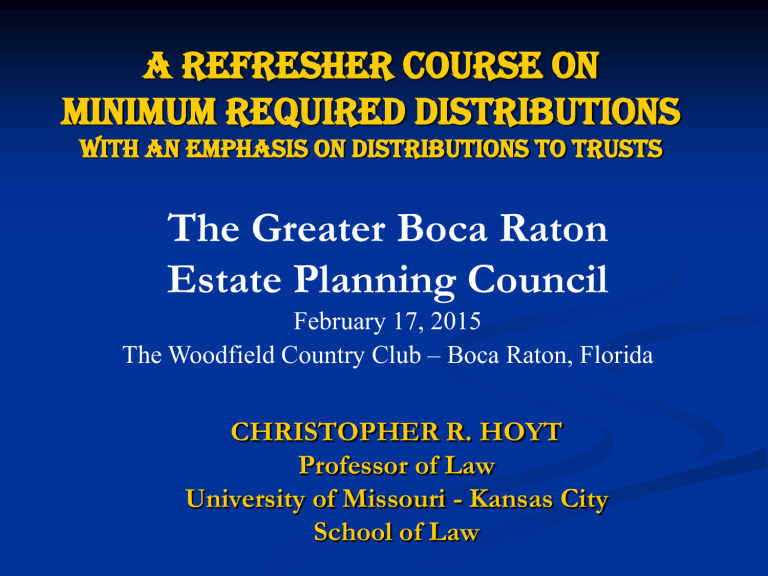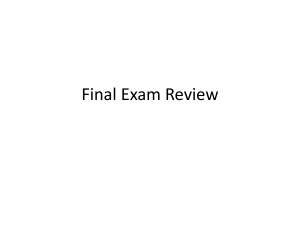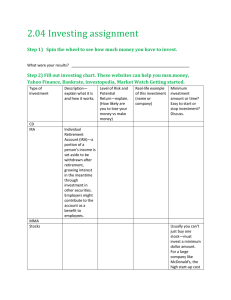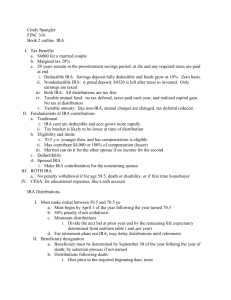2015-RMD Refresher-BOCA

A refresher course on minimum required distributions with an emphasis on distributions to trusts
The Greater Boca Raton
Estate Planning Council
February 17, 2015
The Woodfield Country Club – Boca Raton, Florida
CHRISTOPHER R. HOYT
Professor of Law
University of Missouri - Kansas City
School of Law
RETIREMENT PLAN
DISTRIBUTIONS
* Required Lifetime Distributions
* Bequests of Retirement Assets
-- spouse -- trusts -- charities
THREE STAGES OF A
RETIREMENT ACCOUNT
Accumulate Wealth
Retirement Withdrawals
Distributions After Death
Accumulate Wealth
Tax deduction at contribution
Accumulate in tax-exempt trust
Taxed upon distribution
= Tax Deferred Compensation
Objective of Tax Laws:
Provide Retirement Income
Consequently, there are laws to:
Discourage distributions before age 59 ½
Force distributions after age 70 ½
TYPES OF QRPs
1. Sec. 401 – Company plans
2. Sec. 408 – IRAs
-- SEP & SIMPLE IRAs
3. Sec. 403(b) & 457–Charities
4. Roth IRAs & 401(k)/403(b)
Roth IRA,
Roth 401(k), or Roth 403(b)
INVERSE OF TRADITIONAL:
No tax deduction at contribution
Accumulate in tax-exempt trust
Not taxed upon distribution
THREE STAGES
Accumulate Wealth
Retirement Withdrawals
Distributions After Death
RETIREMENT
TAXATION
General Rule – Ordinary income
Exceptions:
-- Tax-free return of capital
-- NUA for appreciated employer stock
-- Roth distributions are tax-free
USUAL OBJECTIVE:
Defer paying income taxes in order to get greater cash flow
Principal 10% Yield
Pre-Tax Amount
Income Tax on Distribution (40%)
$ 100,000
$ 10,000
40,000
Amount Left to Invest
$ 60,000
$ 6,000 revenue; KS - Colorado
REQUIRED MINIMUM
DISTRIBUTION (“RMD”)
BACKGROUND: 50% penalty if not receive distribution from IRA, 401(k), etc:
#1 – lifetime distributions from own IRA:
beginning after age 70 ½
#2 – an inherited IRA, 401(k), etc –
beginning year after death *
REQUIRED MINIMUM
DISTRIBUTIONS
*LIFETIME DISTRIBUTIONS*
Age of Account Owner Required Payout
70 1/2 3.65%
75 4.37%
80 5.35%
85 6.76%
90 8.75%
95 11.63%
100 15.88%
ADVANTAGES OF
ROTH IRAs
Unlike a regular IRA, no mandatory lifetime distributions from a
Roth IRA after age 70 ½
Yes, there are mandatory distributions after death
THREE STAGES
Accumulate Wealth
Retirement Withdrawals
Distributions After Death
Distributions
After Death
Income taxation
Mandatory ERISA distributions
Estate taxation
Asset Protection
(Clark v. Ramaker)
Collision of four legal worlds at death
Obama air strikes
Distributions
After Death
Income taxation
Mandatory ERISA distributions
Estate taxation
Asset Protection
(Clark v. Ramaker)
( In re Castellano ,
11 B.R. 46854 (Bk. N.D. Ill - Aug. 6, 2014))
Collision of four legal worlds at death yet on I go
Distributions
After Death
> Income taxation
> Mandatory ERISA distributions
> Estate taxation
Collision of three tax worlds at death
INCOME IN RESPECT OF A
DECEDENT - “IRD” – Sec. 691
No stepped up basis for retirement assets
After death, payments are income in respect of a decedent (“IRD”) to the beneficiaries
Common mistake in the past: children liquidate inherited retirement accounts.
Distributions
After Death
> Income taxation
> Mandatory ERISA distributions
> Estate taxation
Collision of three tax worlds at death
Distributions
After Death
•
•
After death, must start liquidating account
Tax planning for family members who inherit: DEFER distributions as long as possible – greater tax savings
“Stretch IRA” – make payments over beneficiary’s life expectancy
Distributions
After Death
“ life expectancy“
Oversimplified: Half of population will die before that age, and half will die after
Implication: For the 50% of people who live beyond L.E. date, an inherited IRA will be empty before they die.
REQUIRED MINIMUM
DISTRIBUTIONS
*LIFE EXPECTANCY TABLE*
Age of Beneficiary Life Expectancy
30 83 53.3 more years
40 83 43.6
50 84 34.2
60 85 25.2
70 87 17.0
80 90 10.2
90 97 6.9
REQUIRED MIN. DISTRIBUTIONS
*LIFE EXPECTANCY TABLE*
“STRETCH IRAS”
Age of Beneficiary Life Expectancy
30 53.3 more years
40 43.6
50 34.2
60 25.2
70 17.0
80 10.2
90 6.9
REQUIRED MIN. DISTRIBUTIONS
*LIFE EXPECTANCY TABLE*
“STRETCH IRAS”
Age of Beneficiary Life Expectancy
30 1.9% 53.3 more years
40 2.3% 43.6
50 2.9% 34.2
60 4.0% 25.2
70 5.9% 17.0
80 10.0% 10.2
90 14.5% 6.9
REQUIRED MINIMUM
*
DISTRIBUTIONS
DEFINITIONS *
Required Beginning Date (“RBD”)
April 1 in year after attain age 70 ½
Designated Beneficiary (“DB”)
A human being. An estate or charity can be a beneficiary of an account,
but not a DB.
Determination Date
September 30 in year after death.
HOW TO ELIMINATE
BENEFICIARIES BEFORE
DETERMINATION DATE
Disclaimers
Full distribution of share
Divide into separate accounts
REQUIRED DISTRIBUTIONS
IF NO
DESIGNATED BENEFICIARY
Death Before RBD Death After RBD
Remaining life
FIVE expectancy of
YEARS someone who is decedent’s age at death
REQUIRED DISTRIBUTIONS
IF ALL BENEFICIARIES ARE
DESIGNATED BENEFICIARIES
Death Before RBD Death After RBD
Maximum term is the life expectancy of the oldest beneficiary of the account. *
Exception if DB is older than decedent
If establish separate accounts, each account
REQUIRED DISTRIBUTIONS
IF SOLE BENEFICIARY
IS SURVIVING SPOUSE
SPOUSE CAN RECALCULATE
LIFE EXPECTANCY
IRAs ONLY: CAN ELECT TO
TREAT IRA AS HER OWN
DECEDENT DIE BEFORE 70 ½?
CAN WAIT FOR DISTRIBUTION
.
SENATE PROPOSAL:
LIQUIDATE ALL INHERITED
IRAs IN FIVE YEARS
2012 – Highway Bill – not enacted
President Obama budget proposal
June, 2014 – Sen. Wyden adds to Highway Bill
EXCEPTIONS
-- Spouse -- minor child -- disabled
-- Person not more than ten years younger
Repub – Hillary curtains
REQUIRED MINIMUM DISTRIBUTIONS
Example: Death at age 80?
CURRENT LAW: *Life Expectancy Table*
Age of Beneficiary
30
Life Expectancy
1.9% 53.3 more years
40 2.3% 43.6
50 2.9% 34.2
60 4.0% 25.2
70 5.9% 17.0
80 10.0% 10.2
90 10.0% 6.9 * [10.2 yrs]
REQUIRED MINIMUM DISTRIBUTIONS
Example: Death at age 80?
PROPOSED: FIVE YEARS if >10 yrs younger
Age of Beneficiary
30
40
Life Expectancy
5 years
5
50 5
60 5
70 5.9% 17.0
80 10.0% 10.2
90 10.00% 6.9 * [10.2 yrs]
SENATE PROPOSAL:
LIQUIDATE ALL INHERITED
IRAs IN FIVE YEARS
EXCEPTIONS
-Spouse -- minor child -- disabled
-- Person not more than ten years younger
TAX TRAP: Does naming a trust for a spouse
(e.g., QTIP trust; credit shelter trust) as an IRA beneficiary mean required liquidation in 5 years?
SENATE PROPOSAL: LIQUIDATE ALL
INHERITED IRAs IN FIVE YEARS
IMPLICATIONS FOR CHARITIES
Donors more likely to consider
Outright bequests
Retirement assets to tax-exempt CRT
Child: income more than 5 years; then charity
Spouse only (marital estate tax deduction)
Spouse & children (no marital deduction )
FUNDING TRUSTS
WITH
RETIREMENT ASSETS
FUNDING TRUSTS
General Rule: Trust is not DB
Exception: “Look-through” trust if four conditions
Types:--
“accumulation trusts”
-- “ conduit trusts
”
Joe price-Heather Counts Garret; Conduit-conting benefic asset protection – accum; ;sep tst; avoid master r
FUNDING TRUSTS
1. There should be a real need for a trust
-- a retirement account is in a trust
-- rules simpler if people are beneficiaries
2. Talk about what clients want to see
-- conflict of state trust law and tax law
-- UPIA default rules
-- Marital estate tax deduction? Rev. Rul.
FUNDING TRUSTS
3. Avoid paying fixed dollar bequests
(“pecuniary bequests”) with retirement assets
4. “Look-through” trust if four conditions
Types:--
“accumulation trusts”
-- “ conduit trusts
”
Conduit – ignore remainder beneficiary ; Asset protection ??
FUNDING TRUSTS
5. Clauses that prevent distributing retirement assets to non-humans after
September 30
6. Dangers if trust will divide into subtrusts
Solution: Name each subtrust as a beneficiary on the IRA beneficiary form
FUNDING TRUSTS WITH
RETIREMENT ASSETS
7.
Challenges when there are multiple beneficiaries with a big age spread (Mom and children)
Common problem with marital bypass trusts and QTIP trusts when surviving spouse is elderly and other beneficiaries are young
MULTIPLE BENEFICIARIES
OF A SINGLE IRA?
•
•
Must liquidate over life expectancy of oldest beneficiary
Payable to a trust? Use life expectancy of oldest trust beneficiary
FUNDING TRUSTS WITH
RETIREMENT ASSETS
Challenges when there are multiple beneficiaries with a big age spread (Mom and children)
Common problem with marital bypass trusts and QTIP trusts when surviving spouse is elderly and other beneficiaries are young
AGE AT DEATH
MEDIAN AGE AT DEATH ON
FEDERAL ESTATE TAX RETURNS:
Age 80 – Men
Age 84 - Women
REQUIRED MINIMUM
DISTRIBUTIONS
*LIFE EXPECTANCY TABLE*
Age of Beneficiary Life Expectancy
30 53.3 more years
40 43.6
50 34.2
60 25.2
70 17.0
80 10.2 more years
90 6.9 more years
USUAL OBJECTIVE:
Defer paying income taxes in order to get greater cash flow
Principal 10% Yield
Pre-Tax Amount
Income Tax on Distribution (40%)
$ 100,000
$ 10,000
40,000
Amount Left to Invest
$ 60,000
$ 6,000
MANDATORY DISTRIBUTIONS
[Assume inherit IRA at age 80 and die at 92]
Own Accumulation Conduit
AGE IRA Trust Trust .
80 5.35% 9.80% 9.80%
85 6.76% 19.23% 13.16%
90 8.78% 100.00% 18.18%
91 9.26% empty 19.23%
92 9.81% empty 20.41%
2-GENERATION CHARITABLE
REMAINDER TRUST
Typically pays 5% to elderly surviving spouse for life, then 5% to children for life, then liquidates to charity
Like an IRA, a CRT is exempt from income tax
Can operate like a credit-shelter trust for IRD assets [no marital deduction]
2-GENERATION CHARITABLE
REMAINDER TRUST
Can be a solution for second marriages when estate is top-heavy with retirement assets. Example:
-- Half of IRA to surviving spouse
-- Other half of IRA to a CRT for 2 nd spouse and children from 1 st marriage
2-GENERATION CHARITABLE
REMAINDER TRUST
TECHNICAL REQUIREMENTS
Minimum 10% charitable deduction
-- all children should be over age 40
CRUT – minimum 5% annual distrib
Not eligible for marital deduction
(see 2002 article on topic)
MANDATORY DISTRIBUTIONS
[Assume inherit IRA at age 80 and die at 92]
Own Accumulation Conduit
AGE IRA Trust Trust .
80 5.35% 9.80% 9.80%
85 6.76% 19.23% 13.16%
90 8.78% 100.00% 18.18%
91 9.26% empty 19.23%
92 9.81% empty 20.41%
MANDATORY DISTRIBUTIONS
[Assume inherit IRA at age 80 and die at 92]
Own Accumulation Conduit
AGE IRA Trust Trust .
C R T .
80 5.35% 9.80% 9.80% 5.00%
85 6.76% 19.23% 13.16% 5.00%
90 8.78% 100.00% 18.18% 5.00%
91 9.26% empty 19.23% 5.00%
92 9.81% empty 20.41% 5.00%
WOULD THE OUTCOME OF
ROLLOVER vs. TRUST
BE ANY BETTER WITH A
YOUNGER SURVIVING SPOUSE?
ANSWER: NO
MANDATORY DISTRIBUTIONS
[Assume surv. spouse inherits IRA at age 70]
Own Accumulation Own Accumul
AGE IRA Trust AGE IRA Trust .
70 3.65% 5.88% 82 5.85% 20.00%
83 6.14% 25.00%
75 4.37% 8.33% 84 6.46% 33.33%
80 5.35% 14.29% 85 6.76% 50.00%
86 7.10% 100.00%
87 7.47% empty
MANDATORY DISTRIBUTIONS
[Assume surv. spouse inherits IRA at age 70]
Own
AGE IRA
Conduit
Trust
Own
AGE IRA
Conduit
Trust .
70 3.65% 5.88% 82 5.85% 11.00%
83 6.14% 11.63%
75 4.37% 7.46% 84 6.46% 12.35%
80 5.35% 9.80% 85 6.76% 13.16%
86 7.10% 14.08%
87 7.47% 14.93%
RETIREMENT ASSETS
IN THE CROSSFIRE OF:
> Income taxation
> Mandatory ERISA distributions
>
Estate taxation
Collision of three tax worlds at death
FUTURE OF ESTATE TAX ?
Year Threshold
2001 $ 675,000
2002-2003 $ 1,000,000
2004-2005 $ 1,500,000
2006-2008 $ 2,000,000
2009 $ 3,500,000
2010 REPEALED ! [* carryover basis]
2011-2014 $ 5,000,000 inflation indexed
2015 $ 5,430,000 inflation indexed
Federal Estate Tax Returns Filed
2011 9,400 26% charit
2007 38,000 20%
2004 62,700 18%
2001 108,000 17%
1998 97,900 17%
1995 69,780 19% oysters
1992 59,200 19%
-
-
NOT MARRIED?
39% of male decedents
75% of female decedents
NO MARITAL DEDUCTION
ESTATE TAX WILL BE DUE
ON I.R.D.
NOT MARRIED?
NO MARITAL DEDUCTION
WHAT IS THE TAX RATE
THAT RICH PEOPLE PAY
ON THEIR INCOME ?
Income tax?
Estate tax?
IF RICH ENOUGH TO PAY
ESTATE TAX, CONSIDER
CHARITY & PHILANTHROPY.
Combination of income & estate taxes
Income $100
Income tax 40 (40%)
Net $ 60
Estate Tax 24 (40% )
Net to Heirs $ 36 ….. in 2015
HOW TO LEAVE A
RETIREMENT
ACCOUNT TO BOTH
FAMILY & CHARITY
CHARITABLE BEQUESTS
FROM QRPs
Best type of bequest: taxable income !
Easier than formality of a will: Name charity as beneficiary on form of plan
-- no need for attorney to draft
-- no need for witnesses, etc.
“You can’t make a charitable bequest unless you have a will”
Wrong. A retirement plan is a trust with its own beneficiary designations. Like other trusts, assets can pass outside probate.
Name a charity as a beneficiary
- the cheapest “charitable remainder trust”
LIFETIME GIFTS: ONLY IRAs
BEQUESTS: ANY QRP
1. Sec. 401 – Company plans
2. Sec. 408 – IRAs
-- SEP & SIMPLE IRAs
3. Sec. 403(b) & 457–Charities
4. Roth IRAs & 401(k)/403(b)
WHAT CAN GO WRONG ?
TWO WAYS TO MAKE A
CHARITABLE BEQUEST FROM A
RETIREMENT ACCOUNT
#1 – NAME CHARITY AS
BENEFICIARY OF THE ACCOUNT
#2 – PAY ACCOUNT TO ESTATE OR
TRUST THAT THEN MAKES A
CHARITABLE BEQUEST
Avoiding Problems With
Charitable Bequests
*
Let Other Beneficiaries
Have Stretch IRA
* Keep IRD Off of Estate’s Income Tax Return
* Guarantee Offsetting Charitable Income Tax
Deduction if Have to Report Income
WHAT CAN GO WRONG #1?
•
•
Other beneficiaries cannot do stretch
IRA if charity is beneficiary?
Solutions:
* cash out charity’s share by Sept 30 or
* separate account for charity
WHAT CAN GO WRONG #2 ?
TWO WAYS TO MAKE A
CHARITABLE BEQUEST FROM A
RETIREMENT ACCOUNT
#1 – NAME CHARITY AS
BENEFICIARY OF THE ACCOUNT
#2 – PAY ACCOUNT TO ESTATE OR
TRUST THAT THEN MAKES A
CHARITABLE BEQUEST
WHAT CAN GO WRONG #2?
Estate or trust has taxable income from receiving IRA distribution, but maybe there is no offsetting charitable income tax deduction when the IRA check is given to a charity.
WHAT CAN GO WRONG?
IRS Chief Counsel Memorandum ILM 200848020
Decedent left his IRA to a trust that benefited his six children and several charities
Trust received cash from IRA; paid entire charitable share, leaving the six children as the only remaining beneficiaries of the trust.
IRS: “Taxable income from IRA, but no charitable deduction.” Reason: trust had no instructions to pay income to charities
WHAT CAN GO WRONG ?
ADVICE:
-- USE METHOD #1 !!!
#1 – NAME CHARITY AS
BENEFICIARY OF THE ACCOUNT
#2 – PAY ACCOUNT TO ESTATE OR
TRUST THAT THEN MAKES A
CHARITABLE BEQUEST
A refresher course on minimum required distributions with an emphasis on distributions to trusts
CHRISTOPHER R. HOYT
Professor of Law
University of Missouri - Kansas City
School of Law



